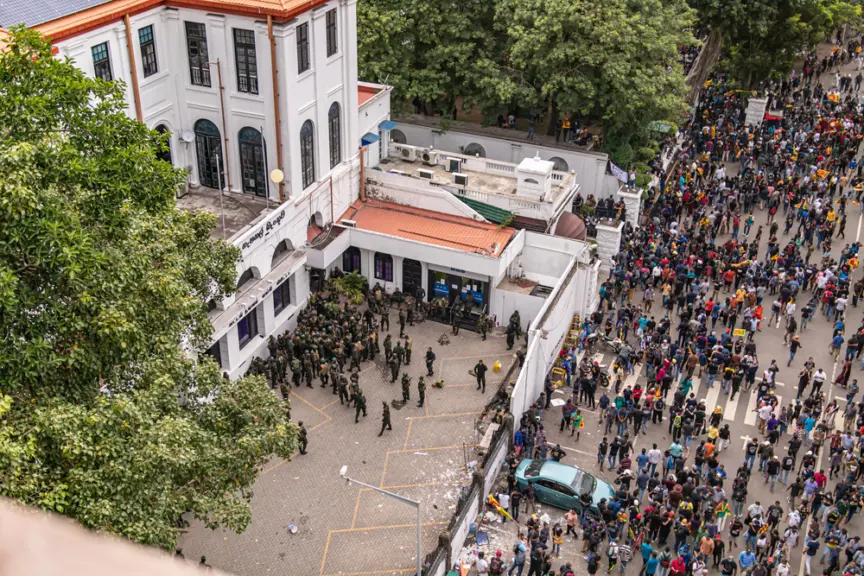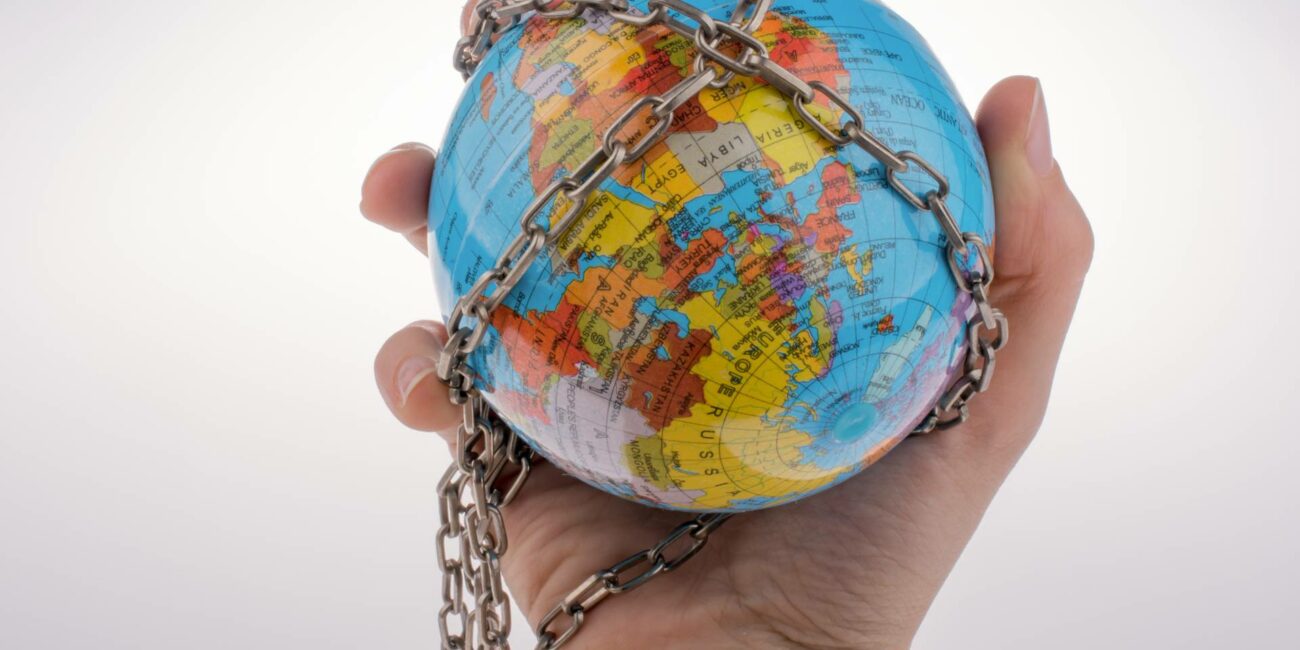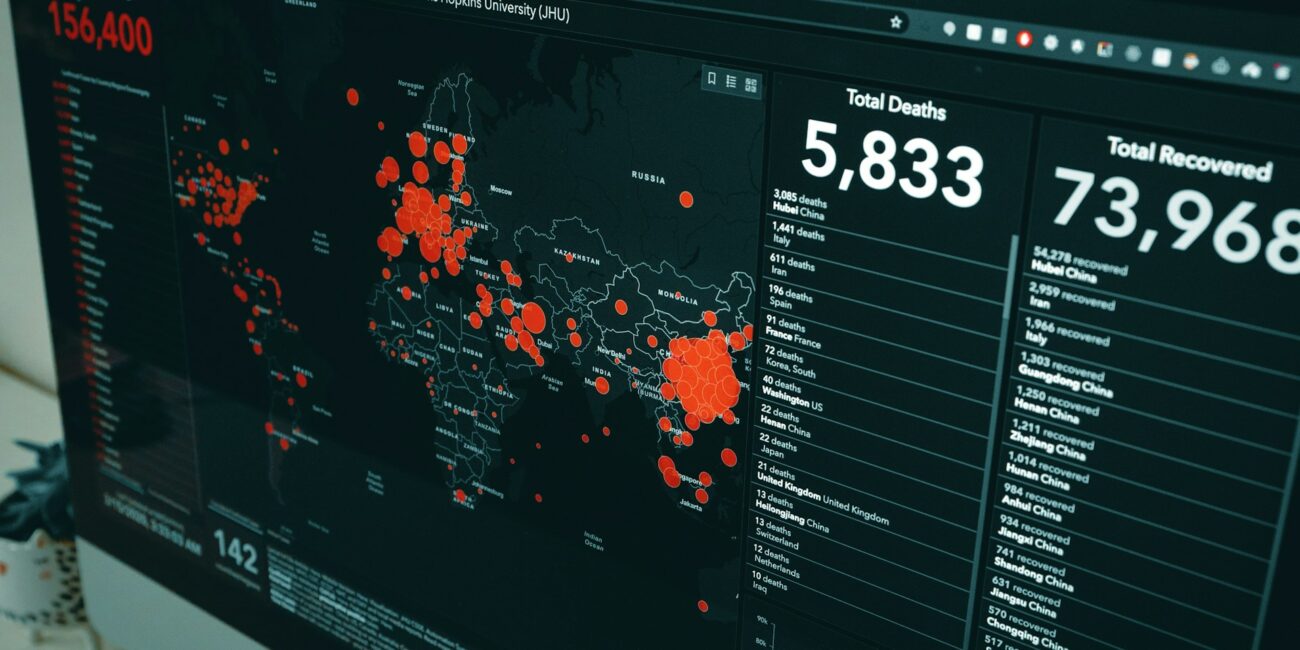by Russell Lamberti – Chief economist and head of research and strategy at Sakeliga
A real-world economic and financial disaster is unfolding in Sri Lanka. Like countless crises before, this one is man-made. The social, economic, and political fragilities that had accumulated in Sri Lanka for years prior to 2020 were mercilessly exposed by the cascade of economic harms and hardships set in motion by the avoidable, unnecessary lockdowns.
Lockdowns inflicted direct harm on almost the entire planet, but Sri Lanka is perhaps the first to feel so painfully the inevitable aftershocks of one of history’s greatest follies.
In July 2022, we began to glimpse astonishing scenes from Colombo, Sri Lanka as multitudes swarmed the president’s home and office in what seemed like a revolt of sheer exasperation, forcing the president to flee the country in a blaze of economic and political chaos. Countrywide protests persist.
Prices in Sri Lanka have soared by about 60%-100% this year. The value of the local currency almost halved in March. Shortages of key commodities bite, leading to unrest and fear as inane import restrictions and foreign currency controls clog up trade for vital goods. The central bank prints money as a hopeless palliative, inevitably fuelling the very problems it pretends to solve, in the process not only destroying ordinary people’s savings but unjustly transferring enormous amounts of wealth to those connected enough to get hold of the new money first.
Sri Lanka serves as both a lesson and a warning to the rest of the world, with urgent implications.
What went wrong?
For years leading up to 2020, Sri Lanka’s economy and state finances were mismanaged by state officials with largely unchecked power and centralised control. The economy revolves around hundreds of loss-making state-owned companies, sucking up subsidies and bailouts from beleaguered taxpayers and foisting debts onto the national government balance sheet.
Central economic planning and large political vanity projects have wreaked fiscal havoc. For years, the government has subsidised living costs to buy votes, obscuring gaping fiscal and economic imbalances that would have to be corrected sooner or later. Large infrastructure contracts are dished out to favoured, inefficient corporate cronies, no doubt for kickbacks into party coffers and politicians’ pockets. Sri Lankan import restrictions have been severely debilitating to key sectors. Policy makers intervene and interfere heavily in key markets and implement harsh controls on capital and foreign exchange.
Like so many governments running out of money, bereft of ideas, and failing to mediate society’s complexity with blunt central plans, Sri Lankan politicians began looking abroad for money – and foreign money comes with strings attached. The country ran up clearly reckless levels of foreign exchange debt over many years, totalling five times its annual tax collections. It opened the door to Chinese brute central planning by accepting infrastructure loans as part of Beijing’s economic foreign policy project, the Belt and Road Initiative. Sri Lanka then accepted loans from multilateral organisations, getting drawn into the political and economic web of the World Bank, IMF, and various other global financial institutions.
If China infused into Sri Lanka a model of wasteful grand infrastructure and demonstrated how to harshly lock down, then the West injected delusions of free money and dangerous green idealism.
Sri Lanka’s treasury and central bank conspired to cut taxes and fill the shortfalls by printing money, seemingly an attempt at practical Modern Monetary Theory (MMT), or at the very least the use of MMT as an academic rationalisation for conjuring much-needed cash, pronto. MMT is a policy option ever more in vogue in recent years that dresses up old dirigiste tricks in new garb, promoting the replacement of tax revenue with printed money as a source of state finance. MMT, when practiced liberally, is an even more extreme version of the type of money creation we see by major central banks. It must be said, however, that during lockdown, central banks like the Federal Reserve in the US came awfully close to direct fiscal funding by the central bank – a key reason why inflation is now very much a problem in the developed world too.
Sri Lanka’s succumbing to the old temptation to create money out of thin air has, predictably, severely debased the currency and caused rampant inflation. In 2021, the state financed around two thirds of its fiscal shortfall by printing money out of thin air and has continued this in 2022.
Then, fertiliser imports were banned as part of new ‘green’ commitments to the international financiers presumably without consulting the farmers – a foreshadowing of what is unfolding in the Netherlands and elsewhere. It predictably slashed the agricultural harvest, raising food insecurity and further diminishing vital expert earnings.
Coup de grâce
Lockdowns were, of course, the coup de grâce. Sri Lanka’s vital tourism industry was extremely hard hit. Foreign travellers had already been deterred by social and political instability prior to 2020. Travel bans were the hammer blow.
Ordinary trade and daily life thrown into disarray by lockdown, then no tourists to bring in foreign exchange earnings as foreign debts racked up, then a central bank printing money to create the illusion of means for a spendthrift government as taxes plunged, money-losing state-owned companies with hopelessly bloated payrolls, constant interference in import-export markets and foreign exchange regulations, and then poor crop harvests from the fertiliser fiasco simply became too much to bear. Sri Lanka fell over.

COLOMBO, SRI LANKA: 9th July 2022: Looking down on a group of riot police in grounds of Hatton National Bank and protestors on Janadhipathi Mawatha — Photo by Valmedia
What next?
Sri Lanka now finds itself at a critical juncture. Can it pull back from the brink or will a chaotic political and social equilibrium push it into a hyperinflationary crisis where all savings and accumulated wealth is consumed and the poor left stranded while capable elites swoop in on what wealth remains? This is the bleak scenario the country faces if mature heads and wise leaders do not prevail out of the morass, reform monetary policy, and devolve economic decisions to consumers and entrepreneurs.
Sri Lanka is an urgent reminder that political and technocratic centralisers playing god with economic policy levers is a sure road to ruin. This long-established truth is now revealed for us once more in a new guise. Sadly, Sri Lanka won’t be the last casualty of the folly of central planning and grand social experiments like lockdowns.
If societies allow rulers to keep forcing their countries to relinquish the productive dynamism of decentralised resource use and trade for the fatal conceit of central economic planners, then they are doomed to one form or another of economic suffering.
It should be regarded as a national scandal when leaders with no personal liability flagrantly incur opaque yet very real debts on behalf of everyone and no-one in particular. In the process, they enable financiers to make off with enormous profits and leave future generations of ordinary citizens in debt servitude. Debt addiction is fragility, a relinquishing of independence, and exposure to the global political and economic elements.
Moreover, monetary systems must be safeguarded from plunder by the corrupt and blindly ideological. The state monopoly on issuing and controlling currency via their central banks afford modern politicians and technocrats a power to manipulate and allocate capital that ancient tyrants could only dream of. Free choice in money and means of payment is essential if money is to cease to be a tool of central economic manipulation and reckless statecraft.
Lastly, Sri Lanka reminds us that we simply cannot afford more great economic disasters like the lockdowns of 2020-2022. Further attempts to so radically control and shut down functioning societies will push them over the edge as their vital founts of productivity dry up and prosperity vanishes. Are these shutdowns naked attempts to centralise economic power, or merely the folly of a hopelessly naive, fearful, and out of touch set? Or perhaps both? Whatever the case, there is simply no longer any room for letting entitled technocrats and reckless centralisers run their personal experiments on the most important life-support system of all: the economy.
The lockdown calamity accelerated the timeline and the urgency to clean house. Sri Lanka is the cautionary tale. Margins of safety are gone. One significant misstep from here on out could be economically fatal. This is the bare-faced reality of life on the other side of lockdowns and its world of scarcer and dearer resources.
Title photo: COLOMBO, SRI LANKA: 9th July 2022: Buddhist monk in saffron robe stands over a crowd of angry protestors and soldiers at the Presidential Secretariat — Photo by Valmedia
Russell Lamberti is chief economist and head of research and strategy at Sakeliga. He is the co-author of When Money Destroys Nations, a book about how hyperinflation destroyed Zimbabwe, how ordinary people survived, and warnings for nations that print money.




